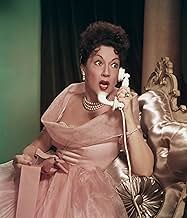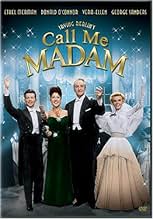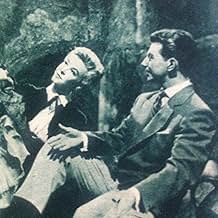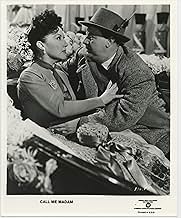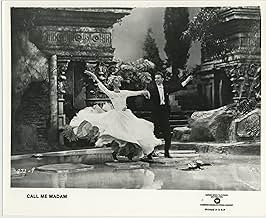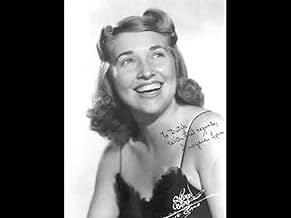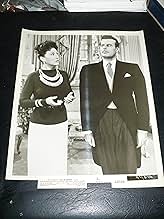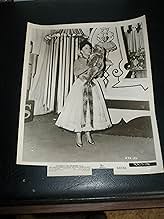IMDb-BEWERTUNG
6,7/10
1533
IHRE BEWERTUNG
Füge eine Handlung in deiner Sprache hinzuWashington hostess Sally Adams becomes a Truman-era US ambassador to a European grand duchy.Washington hostess Sally Adams becomes a Truman-era US ambassador to a European grand duchy.Washington hostess Sally Adams becomes a Truman-era US ambassador to a European grand duchy.
- Regie
- Drehbuch
- Hauptbesetzung
- 1 Oscar gewonnen
- 3 Gewinne & 4 Nominierungen insgesamt
Ludwig Stössel
- Grand Duke Otto
- (as Ludwig Stossel)
David Ahdar
- Dancer
- (Nicht genannt)
Elizabeth Allan
- Singing Telephone Operator
- (Nicht genannt)
Leon Alton
- Minor Role
- (Nicht genannt)
Hanna Axmann-Rezzori
- Telephone Switchboard Operator
- (Nicht genannt)
Leon Belasco
- Band Leader
- (Nicht genannt)
Empfohlene Bewertungen
I came across this thrilling 1953 Fox musical last night by accident and I was immediately hooked. Actually, it became an instant favorite. "Call Me Madam" is loud, sumptuous, indescribably glorious screen version of Irving Berlin's stage musical, directed with luminous extravagance by Walter Lang. The Technicolor is breathtaking! Ethel Merman as the eccentric socialite turned US diplomat to Lichtenburg, is sometimes hard to take. Her romance with the heavily accented Foreign Minister named Cosmo, played by George Sanders, is slightly forced.
Still, the highlights are the captivating Berlin songs - "Hostess With The Mostes", "You're Just In Love", "Something to Dance About", "It's a Lovely Day Today" - not to mention the glorious dancing by the young couple in love, Donald O'Connor and Vera-Ellen. They were a joy to watch.
Still, the highlights are the captivating Berlin songs - "Hostess With The Mostes", "You're Just In Love", "Something to Dance About", "It's a Lovely Day Today" - not to mention the glorious dancing by the young couple in love, Donald O'Connor and Vera-Ellen. They were a joy to watch.
Ethel Merman was unique in the annals of the American Musical Theater -she was responsible for the success of more shows, and introduced more songs that became Broadway standards (and by the best composers) than any other performer - even Mary Martin and Gwen Verdon never quite de-throned the First Lady of Musical Theater. But Merman is one of those whose talent didn't quite transcend the big screen, despite several attempts. Anyone seeing her on the screen today may well wonder what all the fuss was about, but take it from an eyewitness: Merman was a force of nature who had to be seen live to be appreciated - when she set foot on a stage, she OWNED that stage, the scenery, and every seat, patron, and brick of that theater.
Although it came along too late to make her a real movie star (she was in her mid-40s already and, unfortunately, wasn't aging gracefully), CALL ME MADAM is her best movie, and gives us the closest approximation of how the Merman magic lit up the stage (and the box-office). MADAM was very much a star vehicle, the kind they don't have today (let's face it: because they don't have such stars), and there wouldn't have been any point in filming it with anyone else - every situation, line, lyric and note of music was tailored to her style, personality, and, of course, voice (aside from the fact that the show is very dated politically, that's the other reason it was seldom revived without her. GYPSY, though a much better show, was considered a sacred Merman vehicle until Angela Lansbury tackled it in 1973 - it's been revived regularly ever since). Merman was known for 'freezing' a performance, seldom varying it by a syllable throughout a show's long run, and often claimed to be thinking about her grocery list while she was belting out a song. Though she probably 'tweaked' her performance for the screen, what we see here is very likely the way she played Sally Adams hundreds of times before and after the movie.
Although she certainly dominates the proceedings, Merman surprisingly doesn't hog the show (she even gave one of her songs over to Donald O'Connor, "Something To Dance About") - everyone gets their chance to shine, from George Sanders (not playing a cad for once, and displaying an excellent singing voice) to the wonderful Donald O'Connor and Vera-Ellen. O'Connor was riding the crest of his success in SINGIN' IN THE RAIN, and he's almost as good here - his performance is a joy, whether dancing with Vera-Ellen, by himself, or teaming up with Merman for the legendary duet of "You're Just In Love" that stopped the show cold on-stage (he was fond of saying that one of the Merm's high notes bent his eardrum!).
So pop this one in, sit back and have a wonderful time watching several seasoned troupers doing what they did best - entertaining!
Although it came along too late to make her a real movie star (she was in her mid-40s already and, unfortunately, wasn't aging gracefully), CALL ME MADAM is her best movie, and gives us the closest approximation of how the Merman magic lit up the stage (and the box-office). MADAM was very much a star vehicle, the kind they don't have today (let's face it: because they don't have such stars), and there wouldn't have been any point in filming it with anyone else - every situation, line, lyric and note of music was tailored to her style, personality, and, of course, voice (aside from the fact that the show is very dated politically, that's the other reason it was seldom revived without her. GYPSY, though a much better show, was considered a sacred Merman vehicle until Angela Lansbury tackled it in 1973 - it's been revived regularly ever since). Merman was known for 'freezing' a performance, seldom varying it by a syllable throughout a show's long run, and often claimed to be thinking about her grocery list while she was belting out a song. Though she probably 'tweaked' her performance for the screen, what we see here is very likely the way she played Sally Adams hundreds of times before and after the movie.
Although she certainly dominates the proceedings, Merman surprisingly doesn't hog the show (she even gave one of her songs over to Donald O'Connor, "Something To Dance About") - everyone gets their chance to shine, from George Sanders (not playing a cad for once, and displaying an excellent singing voice) to the wonderful Donald O'Connor and Vera-Ellen. O'Connor was riding the crest of his success in SINGIN' IN THE RAIN, and he's almost as good here - his performance is a joy, whether dancing with Vera-Ellen, by himself, or teaming up with Merman for the legendary duet of "You're Just In Love" that stopped the show cold on-stage (he was fond of saying that one of the Merm's high notes bent his eardrum!).
So pop this one in, sit back and have a wonderful time watching several seasoned troupers doing what they did best - entertaining!
There's been a long wait to revisit the delights of this brassy film recreation of a big Broadway hit, but now we can once again enjoy it, fairly bursting from the screen, with its several lively production numbers, John DeCuir's classy production design, Irene Sharaff's flattering costumes, plus Robert Alton's absolutely first-rate choreography. Check out Vera-Ellen and an ultra-well-rehearsed chorus of dancers in "The Orcarina" number, as well as her amazing dance duets with Donald O'Connor, who smoothly displays his exceptional terpsichorean ability, so well showcased two years earlier in MGM's "Singin' in the Rain." George Sanders's singing is a wonderful surprise, holding his own with leather-lunged Madame Merman, who had triumphed on Broadway with this votive offering to her stardom, so cleverly crafted by Irving Berlin. Alfred Newman's Oscar for his endlessly inventive musical direction was more than well-deserved. For anyone who thinks that M-G-M was the only studio to adequately mount a film musical, this one might convince fans of this genre otherwise. (The DVD, by the way, is a very nice transfer, and boasts a quite informative commentary by "Musical Film Scholar" Miles Kreuger.)
10nmayers
Both Ethel Merman and Donald O'Connor suffered from the same misfortune -- lack of quality movie roles to showcase their extraordinary gifts. In O'Connor's case, it was because from childhood up into his middle twenties he was contracted by Universal Studios which, up 'til that time, produced "B" movies, suitable for coming into an air-cooled movie theater on a hot summer's day, but not much else. He always shone brightly, however, even in those early films, but not 'til Singin' In The Rain -- and Call Me Madam -- did he get the chance to glitter in great "A" material. Ethel Merman, the greatest of the Broadway greats had expansive mannerisms, stereophonic lungs, and irrepressable exhuberance, and was not considered cinema material by the powers that be. See how wrong the powers can be? O'Connor and Merman together in this film make it great -- his dancing, her voice, their personalities blending in just the right way. Great movie with two great leads -- don't miss "Call Me Madam"!
Carol Channing, Mary Martin, Ethel Merman - the three biggest stars of Broadway between 1940 and 1970, and none made as big an imprint in movies. This seems to be a running sore in cinematic history - so few stage stars were great film figures. Some, like George M. Cohan, did not like the restrictive effects of movie making, and made few stabs at film (though, fortunately, Cohan made THE PHANTOM PRESIDENT in 1932). Others just seemed to weak on film. The great Pauline Lord made one movie, the pathetic MISS WIGGS OF CABBAGE PATCH, which (if recalled at all) is remembered as a film "starring" (he was actually in a supporting role) W.C.Fields. Channing, star of GENTLEMEN PREFER BLONDS watched while that role went to Marilyn Monroe, and star of HELLO DOLLY watched as that role went to Barbara Streisand. Martin, star of SOUTH PACIFIC saw Mitzi Gaynor play Nellie Forbush, and star of THE SOUND OF MUSIC saw the role of Maria Von Trapp become identified with Julie Andrews. Merman with credits like ANYTHING GOES, PANAMA HATTIE, ANNIE GET YOUR GUN, and GYPSY, only was able to keep the role of Reno Sweeny in ANYTHING GOES, when it was first made into a film in the 1930s. She was fortunate to also have the role of Sally the ambassador in CALL ME MADAM on film. It was a rarity, because she knew the part and was able to shine in a film adaptation. It's success probably enabled her to get another lead in the musical THERE'S NO BUSINESS LIKE SHOW BUSINESS. But the latter film, despite her good work in it (and Dan Dailey's, Mitzi Gaynor, and Donald O'Connor's)is recalled because Marilyn Monroe sang "We're Having a Heat Wave". Merman never led in another musical film again, and would be overlooked for GYPSY (when Rosalind Russell got the part).
At least here and in the first ANYTHING GOES we see how she handled stage roles in her career. Mary Martin was less successful, her film record of her stagecraft limited to the scene in the first Cole Porter biopic NIGHT AND DAY, when she sings the song MY HEART BELONGS TO DADDY as she did on stage (unfortunately two of her chorus, Gene Kelly and Van Johnson, were not asked to repeat their chorus boy parts). There is the television version of PETER PAN, which is on video. It's fortunate that exists (there is also some songs from SOUTH PACIFIC that were sung with Ezio Pinza on THE ED SULLIVAN SHOW). The rest is silence. As for Channing, the only time she appeared in a movie musical, it was as the wacky aunt of Mary Tyler Moore in THOROUGHLY MODERN MILLIE (a movie not based on any stage musical). Channing had little singing to do in it.
So Merman was able to do one great performance on film. CALL ME MADAM, a musical spoof on the career of political hostess Pearl Mesta, was a charming little musical (no ANNIE GET YOUR GUN, though). It's best musical moment is the duet with Donald O'Connor (I HEAR MUSIC BUT I DON'T KNOW WHERE), and it is a romantic piece of fluff. Nice also to see George Sanders playing a decent chap for a change. But watching Merman at her best, makes one regret what was not captured on film of her other performances. Ironically, that great singing voice is best recalled as a "loud-mouth broad" voice from Merman's best remembered role: the obnoxious mother-in-law of Milton Berle in IT'S A MAD, MAD, MAD, MAD WORLD.
At least here and in the first ANYTHING GOES we see how she handled stage roles in her career. Mary Martin was less successful, her film record of her stagecraft limited to the scene in the first Cole Porter biopic NIGHT AND DAY, when she sings the song MY HEART BELONGS TO DADDY as she did on stage (unfortunately two of her chorus, Gene Kelly and Van Johnson, were not asked to repeat their chorus boy parts). There is the television version of PETER PAN, which is on video. It's fortunate that exists (there is also some songs from SOUTH PACIFIC that were sung with Ezio Pinza on THE ED SULLIVAN SHOW). The rest is silence. As for Channing, the only time she appeared in a movie musical, it was as the wacky aunt of Mary Tyler Moore in THOROUGHLY MODERN MILLIE (a movie not based on any stage musical). Channing had little singing to do in it.
So Merman was able to do one great performance on film. CALL ME MADAM, a musical spoof on the career of political hostess Pearl Mesta, was a charming little musical (no ANNIE GET YOUR GUN, though). It's best musical moment is the duet with Donald O'Connor (I HEAR MUSIC BUT I DON'T KNOW WHERE), and it is a romantic piece of fluff. Nice also to see George Sanders playing a decent chap for a change. But watching Merman at her best, makes one regret what was not captured on film of her other performances. Ironically, that great singing voice is best recalled as a "loud-mouth broad" voice from Merman's best remembered role: the obnoxious mother-in-law of Milton Berle in IT'S A MAD, MAD, MAD, MAD WORLD.
Wusstest du schon
- WissenswertesThis is the only full film musical that George Sanders made, despite his appealing singing voice.
- Zitate
Cosmo Constantine: You are the most American American I have ever met.
Sally Adams: That's the nicest thing anyone's ever told me.
- Crazy CreditsDuring the opening credits, as each word in the title appears onscreen, we hear, but do not see, Ethel Merman exclaiming, in a demanding tone of voice: "Call..me..madam!"
- VerbindungenFeatured in Fred Astaire Salutes the Fox Musicals (1974)
- SoundtracksOverture
Music and Lyrics by Irving Berlin
Performed by Ethel Merman and the 20th Century-Fox Studio Orchestra and Chorus
Top-Auswahl
Melde dich zum Bewerten an und greife auf die Watchlist für personalisierte Empfehlungen zu.
- How long is Call Me Madam?Powered by Alexa
Details
- Erscheinungsdatum
- Herkunftsland
- Offizielle Standorte
- Sprache
- Auch bekannt als
- Call Me Madam
- Drehorte
- Produktionsfirma
- Weitere beteiligte Unternehmen bei IMDbPro anzeigen
- Laufzeit
- 1 Std. 54 Min.(114 min)
- Seitenverhältnis
- 1.37 : 1
Zu dieser Seite beitragen
Bearbeitung vorschlagen oder fehlenden Inhalt hinzufügen


